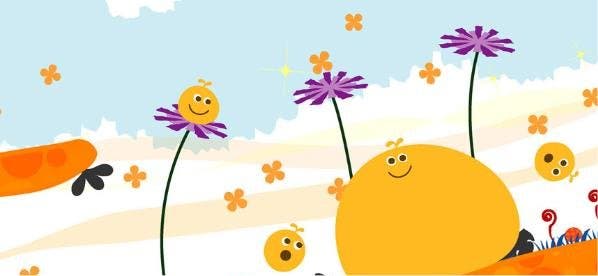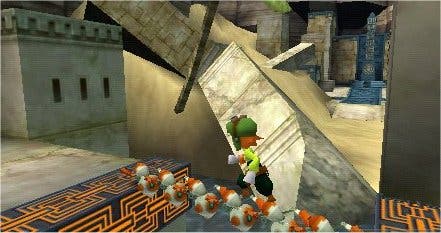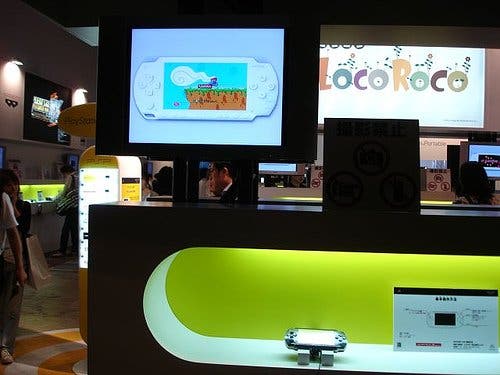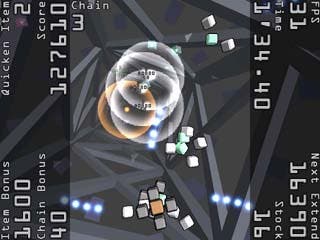PSP: Station X
The quirky PSP games at TGS.
For a very long time, it was PlayStation Importable. Then, £179.99 and September 1st later, we realised it was PlayStation Portable instead - as the release schedule groaned under the weight of games we already owned and stuff we expected to buy on other formats. We want new games. What's the point of spending all that money if we're just being taxed for the option of taking our normal console toys out of the house?
What we want - and what portable games consoles have always been good at giving us - are bizarre and inventive little games that stand out from the crowd. Wario Ware, Ouendan, Yoshi Universal Gravitation - that kind of thing. Of course, on the PSP the problem of coming up with them is amplified because the games have to stand out from Burnout This and Gran That, not just the Mario Brothers and every other 2D sprite-based thingy. But even so, these PSP games we want must exist. We must find them. We must. Because, well, otherwise all that'll be left will be ports of FIFA and Gran Turismo. We don't know about you, but we don't want to live in a world ruled by Grans.
Hurrah then, because - as you've probably guessed by now in spite of our Houdini-esque subterfuge - there was evidence of some at the Tokyo Game Show this past week. And we're not just talking about Katamari Damacy, because you're already well versed in that (and you're going to be suitably versed in the PSP version front when we get around to writing up our TGS impressions), and we're not talking about TalkMan either (because Yoshi Yamamoto did plenty of talking already). We're talking about things like Karakuri and LocoRoco, about Byte Hell 2000 and Key of Heaven; about things even we hadn't heard of when we stumbled groggily out of Narita airport this time last week.

Loco Roco first. It's odd that we should mention Yoshi Universal Gravitation earlier because this calls that to mind. The idea is to help a little orange blob through a colourful platform-style level. The twist (almost literally) is that you do this by tilting the level 45 degrees left or right using the shoulder buttons, and hitting both shoulders together to jump.
Along the way you have to navigate spikes, which kill one blob for each spike, as well as platforms that swing this way and that based on where the level's tilting, and other obstacles including a cog-like system that connects a tunnel to precarious platforms over spike-pits. To complicate matters, you have to split the blob into smaller blobs or combine it into a larger one in order to complete certain puzzles. When the blobs can become separated, you're forced to try and keep them all "alive" in different positions, and each small blob has less "health" when it's cut from the whole. The closest comparison we can think of is Mercury - itself a unique and interesting PSP title - except played from a side-on, 2D perspective using the, er, shoulder buttons.
Loco Roco's already causing a bit of excitement among the specialist press (that's what the bastards call us) and should be out in Japan toward the end of the year. The fascination is the mixture of (relatively) obscure control system, old-school platform and puzzle game designs (plural), and the saccharine-sweet visuals.

Karakuri (or Tokobots), meanwhile, may not be quite so sickly sweet, but it does have elements of sweetness about it. Also due by the end of the year it is, as you may recall, one of Tecmo's handheld projects (the others including that wonderfully pornographic DS gambling game, which we definitely did not buy earlier this week in Akihabara for 4380 yen - except we did), but surprisingly it's neither beat-'em-up nor sex show. Instead it's a sort of puzzly 3D platformer. You play a small chap surrounded by six little robots (Karakuri, presumably), and in addition to the usual analogue movement and jump controls, you also have the option to form your little friends into a line - either behind you, in two ranks of three on either side of you, or in a circle around you.
Each formation has particular applications - usually accessed by holding the right shoulder and hitting a face button. If a platform's too high to reach, you can use the single-file line option to swing your little chums up above your head and then climb them like a ladder. Or you can swing from them, using them like a rope. If you need to push a block you can form them around you. If you have an urgent need to butt-stomp an enemy (hurrah!), you can go for that formation and then hit the action button in mid-air. Similarly, you can twirl round with three on each side, or swing them all over your head like a sort of organic mallet. And we're all about organic mallets here at Eurogamer.

Then there's Byte Hell 2000. There's a tendency for Westerners to refer lazily to the "bonkers Japanese" when faced with things like Byte Hell, but when you play it you can kind of understand the behaviour. From what we can gather, it's a collection of 2D, retro-styled mini-games set to the sound of some bizarrely stirring piano music. And gathering that has been a bit like trying to find firewood in outer space; even deciphering the name from the upside-down-and-back-to-front writing on the TGS pod involved us calling in Japanophile friends on several continents.
The games themselves are almost insultingly simple but peculiarly addictive. In one, a woman places a block of wood on a tree stump and you have to hit X quickly to chop it. She does this repeatedly. You hit X a lot. It counts every chopped block. Then she puts a bunny on the block and you hit X. Game Over. 9 blocks chopped. So you start again, trying to avoid chopping the bunny, but get caught out by a different coloured bunny. Then some other woodland animal. Why is this fun? Then there's the baseball game. The ball gets whacked out to roughly where you're standing in the diamond and you move into its path to catch it, and hit X to chuck it to first base. Sometimes you have to dive for it. Again, counting. Again, if you miss (three times) you're out. Another game involves judging when to brake as you're propelled along a clifftop so that you'll stop as close to the edge as possible and not fall off - hanging in the air Wile E Coyote style and then plummeting to your doom.
It's all incredibly simple, put together in a graphical style reminiscent, appropriately enough, of Nintendo's Wario Ware. Even the main characters bear a striking resemblance to Mario and Luigi - and we dare say the main play modes probably aren't as straightforward as this. Or are they? Frankly, we have no idea - but we're keeping an eye on Byte Hell 2000 because it's clearly, er, bonkers Japanese. Out in Japan this December.
Elsewhere we had the chance to take our first look at Key of Heaven, an internally developed action-role-playing game from Sony. We'll be writing more on this soon, but to give you a brief idea: you collect fighting moves and then stitch them together on "Bugei scrolls". Then, when you're roaming the land, you just call them into play and watch the complicated carnage unfold. The trick seems to be avoiding taking hits while you're at it. Could be interesting. One game we're not sure about, however, is Namco's Portable Resort. Originally mentioned some time ago at PlayStation Meeting, it's a kind of ambient relaxation thing; the idea being to spend time on an island (nothing like Lost, sadly) strumming the ukulele (literally - holding the PSP screen-outward and thumbing the analogue nub) and soaking up the sun. It has a whole day and night cycle and Namco perplexingly envisages you leaving it turned on while you sit around at your desk or in bed.

Finally, we'd like to tell you a few things about Tetsuya Mizuguchi and Q Entertainment's latest, Every Extend Extra, but we actually needn't bother, because you can already download the full PC game, upon which it's based, and play it for yourself. (Just plug the words "Every Extend" into Google - it's about 10MB and should be available from various sources.) For those of you who might not be able to do that, the theme is "Music X Shooting" (much as Lumines was "Music X Puzzle") and it qualifies more for comparison to Rez than anything else in Mizuguchi's canon of work to date. Speaking of Mizuguchi, it's worth reiterating that he mentioned Lumines 2 in a recent online chat. Not that he needs any more publicity.
It's good to see he's still beavering away on the PSP though - and it's good to see so much PSP support at TGS. With any luck, it won't matter whether or not that PSP stamped "March 2005" we saw in Akihabara earlier was a 1.5 or not after all.
Wish us luck though, eh?








